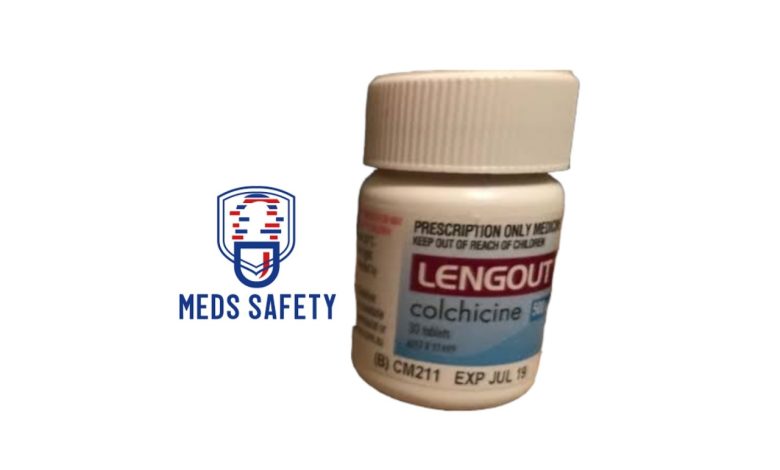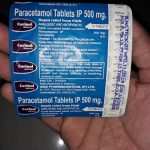Lengout Tablets: Uses, Benefits, Dosage, Side Effects, Interactions

What is Lengout?
Lengout is an antigout medication that contains colchicine as the active ingredient. Lengout is used for the relief of pain in acute attacks of gout. Gout is caused when a substance called uric acid forms painful crystals in the body, typically in the joints.
Lengout is not an analgesic and does not provide relief from other types of pain. Lengout has a preventative effect that helps to reduce the incidence of acute attacks. It will not reduce the amount of uric acid in the body.
Each tablet of Lengout contains 0.5 mg of colchicine.
How it works
Colchicine the active ingredient in this medications belongs to a class of drugs called anti-gout medications. A class of drugs is a group of medications that work in a similar way. These drugs are often used to treat similar conditions.
The way Lengout works is not fully understood. It may prevent some of the body’s immune cells from causing pain and inflammation.
Before taking Lengout
Before taking Lengout, it’s imperative to consider specific factors to ensure your safety and the efficacy of the medication. To begin with, you should avoid taking Lengout if you have a known allergy to colchicine or any of the ingredients listed at the end of this leaflet. Allergic reactions can manifest with symptoms like shortness of breath, wheezing, facial swelling, skin rash, itching, or hives, and immediate medical attention may be necessary if such reactions occur. Additionally, it’s crucial to note that Lengout is not intended for use in children, as it can pose potential risks to their well-being, underscoring the need to store it out of their reach.
Certain medical conditions serve as contraindications for Lengout usage. Specifically, this medication should not be taken if you have combined kidney and liver disease, severe kidney or liver disease, serious heart conditions, a severe stomach disorder, or a blood disorder. These conditions may interact with Lengout in a way that is detrimental to your health. Furthermore, it’s vital to take a look at the expiry date (EXP) printed on the medication’s packaging. Using Lengout after this date has passed may result in diminished effectiveness. Equally important is ensuring that the medication’s bottle does not exhibit signs of tampering. Using tampered medication can compromise your safety and the medication’s reliability. These precautions and considerations should guide your decision to take Lengout and are crucial for ensuring its safe and effective use.
Dosage
This dosage information is for Lengout oral tablet. All possible dosages and drug forms may not be included here. Your dosage, drug form, and how often you take the drug will depend on:
• your age
• the condition being treated
• how severe your condition is
• other medical conditions you have
• how you react to the first dose
For the treatment of gout flares, the maximum recommended dose is 1.5 milligrams over a one-hour period. It’s crucial to note that this dosage should not be repeated within a three-day period to prevent potential complications.
Administering Lengout correctly is equally important for its efficacy. The medication should be swallowed as a whole tablet with a full glass of water. This ensures that the medication is delivered to your system as intended. You have the flexibility to take Lengout either before or after a meal, depending on your personal preference or any guidance your doctor provides.
How long should I take Lengout?
The duration of Lengout usage depends on your specific medical condition and your response to the treatment. It’s imperative to continue taking the medication for as long as your doctor advises. Lengout is a control measure for gout, but it does not offer a cure. Should you experience stomach pain, nausea, vomiting, or diarrhea while taking Lengout, it is vital to cease its use immediately, even if your symptoms persist.
If you happen to forget a dose of Lengout, there is a clear course of action. If it’s nearly time for your next scheduled dose, it’s advisable to skip the missed dose and take the next one as instructed. Avoid doubling up on the medication to compensate for the missed dose, as this can increase the risk of undesirable side effects. If you are uncertain about what to do, seeking guidance from your doctor or pharmacist is a prudent step. If you tend to have difficulty remembering to take your medication, your pharmacist can also provide you with some useful strategies or reminders to help you stay on track with your treatment plan.
Lengout benefits
Lengout offers several benefits when used in the management of gout and related conditions. Here are some of the key benefits associated with Lengout:
1. Pain Relief: Lengout is primarily prescribed for the relief of pain in acute gout attacks. Gout is a painful condition caused by the accumulation of uric acid crystals in the joints. Colchicine, the active ingredient in Lengout, helps reduce the inflammation and pain associated with gout flares. This pain relief can significantly improve the quality of life for individuals experiencing gout attacks.
2. Preventive Effect: In addition to providing pain relief, Lengout also has a preventive effect. It helps reduce the incidence of acute gout attacks when taken as prescribed. This preventive aspect can be especially beneficial for individuals who experience frequent gout flares, as it may help reduce the frequency and severity of these painful episodes.
3. Prescription Medication: Lengout is available only with a doctor’s prescription. This ensures that it is used under the guidance of a healthcare professional who can tailor the treatment to the patient’s specific needs. The prescription requirement also helps in monitoring the medication’s usage and potential side effects.
4. Non-Addictive: Lengout is not considered addictive, providing reassurance that it is unlikely to lead to dependency or misuse. This characteristic is essential for its responsible use in managing gout.
5. Patient-Specific Treatment: Dosage and treatment duration are determined by the prescribing doctor, allowing for a personalized approach to gout management. This ensures that the treatment aligns with the patient’s unique medical history, gout severity, and response to the medication.
6. Flexibility in Timing: Lengout can be taken before or after meals, providing flexibility to patients and accommodating their individual preferences and schedules.
7. Management of Gout: While Lengout does not cure gout, it plays a crucial role in controlling the condition. Gout is a chronic ailment, and Lengout helps manage the symptoms and reduce the frequency of painful gout attacks. This can lead to an improved quality of life for individuals with gout.
Lengout side effects
Lengout oral tablet doesn’t cause drowsiness. However, it may cause other side effects.
More common side effects
The more common side effects of Lengout can include:
• pain in the abdomen (stomach area)
• constipation
• diarrhea
• nausea
• vomiting
If these effects are mild, they may go away within a few days or a couple of weeks. If they’re more severe or don’t go away, talk to your doctor or pharmacist.
Serious side effects
Call your doctor right away if you have serious side effects. Call 911 if your symptoms feel life-threatening or if you think you’re having a medical emergency. Serious side effects and their symptoms can include the following:
• Rhabdomyolysis (muscle damage). This serious syndrome can cause kidney disease, and can be life-threatening. Symptoms can include:
o muscle weakness
o muscle pain
Can you take Lengout and Voltaren together?
Taking Lengout and Voltaren (diclofenac) together should be done cautiously and under medical supervision, as both medications can potentially cause gastrointestinal side effects. Lengout may lead to stomach upset and diarrhea, while Voltaren is an NSAID that can also affect the stomach and intestines. Combining these two medications may increase the risk of experiencing gastrointestinal problems. If your healthcare provider prescribes both drugs concurrently, they have likely weighed the potential risks and benefits for your specific condition. It’s crucial to follow their instructions closely, report any unusual symptoms, and consider protective measures such as taking the medications with food or using additional medications to reduce the risk of gastrointestinal issues.
Lengout may interact with other medications
Lengout oral tablet can interact with other medications, vitamins, or herbs you may be taking. An interaction is when a substance changes the way a drug works. This can be harmful or prevent the drug from working well.
To help avoid interactions, your doctor should manage all of your medications carefully. Be sure to tell your doctor about all medications, vitamins, or herbs you’re taking. To find out how this drug might interact with something else you’re taking, talk to your doctor or pharmacist.
Drugs you should not use with Lengout
Taking certain drugs with Lengout can cause dangerous effects in the body. Examples of drugs you should not use with Lengout include:
• Antifungal drugs, such as ketoconazole or itraconazole. Using these drugs with Lengout can result in very high levels of Lengout in your body. This raises your risk of side effects, such as severe muscle damage.
• HIV drugs, such as indinavir, atazanavir, nelfinavir, saquinavir, or ritonavir. Using these drugs with Lengout can result in very high levels of Lengout in your body. This raises your risk of side effects, such as severe muscle damage.
• Antibiotics, such as clarithromycin or telithromycin. Using these drugs with Lengout can result in very high levels of Lengout in your body. This raises your risk of side effects, such as severe muscle damage.
• Antidepressants, such as nefazodone. Using these drugs with Lengout can result in very high levels of Lengout in your body. This raises your risk of side effects, such as severe muscle damage.
Interactions that increase your risk of side effects
Taking Lengout with certain medications raises your risk of side effects from Lengout. Examples of these drugs include:
• Cholesterol drugs, such as atorvastatin, fluvastatin, lovastatin, pravastatin, simvastatin, fibrates, or gemfibrozil. Increased side effects can include serious muscle damage. Your doctor may reduce your dosage of Lengout to avoid this.
• Digoxin, an antiarrhythmic drug. Increased side effects can include serious muscle damage. Your doctor may reduce your dosage of Lengout to avoid this.
• Heart drugs, such as verapamil or diltiazem. Increased side effects can include stomach pain, constipation, diarrhea, nausea, or vomiting. Your doctor may reduce your dosage of Lengout to avoid these problems.
Disclaimer: Our goal is to provide you with the most relevant and current information. However, because drugs interact differently in each person, we cannot guarantee that this information includes all possible interactions. This information is not a substitute for medical advice. Always speak with your healthcare provider about possible interactions with all prescription drugs, vitamins, herbs and supplements, and over-the-counter drugs that you are taking.
Lengout warnings
Lengout oral tablet comes with several warnings.
Allergy warning
Lengout can cause a severe allergic reaction. Symptoms can include:
• trouble breathing
• swelling of your throat or tongue
If you have an allergic reaction, call your doctor or local poison control center right away. If your symptoms are severe, call 911 or go to the nearest emergency room.
Don’t take this drug again if you’ve ever had an allergic reaction to it. Taking it again could be fatal (cause death).
Food interactions
Grapefruit or grapefruit juice may make your body less able to process Lengout. This can increase levels of the drug in your body and result in more side effects. Don’t eat grapefruit or drink grapefruit juice if you’re taking this drug. See: List Of Foods To Avoid When Taking Colchicine
Warnings for people with certain health conditions
For people with kidney disease: Your kidneys clear this drug from your body. If they’re not working well, levels of this drug may build up in your body, raising your risk of side effects. To help avoid this, your doctor may lower your dose of Lengout.
For people with liver disease: Your liver processes this drug in your body. If it’s not working well, levels of this drug may build up in your body, raising your risk of side effects. To help avoid this, your doctor may lower your dose of Lengout.
Warnings for other groups
For pregnant women: Lengout is a category C pregnancy drug. That means two things:
1. Research in animals has shown adverse effects on the fetus when the mother takes the drug.
2. There haven’t been enough studies done in humans to be certain how the drug might affect the fetus.
Talk to your doctor if you’re pregnant or planning to become pregnant. This drug should only be used if the potential benefit justifies the potential risk to the fetus. Call your doctor right away if you become pregnant while taking this drug.
- For women who are breastfeeding: Lengout may pass into breast milk and may cause side effects in a child who is breastfed. Talk to your doctor if you breastfeed your child. You may need to decide whether to stop breastfeeding or stop taking this medication.
- For seniors: The kidneys of older adults may not work as well as they used to. This can cause your body to process drugs more slowly. As a result, more of a drug stays in your body for a longer time. This raises your risk of side effects.
- For children: It hasn’t been established that Lengout is safe and effective in the treatment of gout in children.
Important warnings
• Overdose warning: Taking too much Lengout can be serious enough to cause death. Never take more of this drug than your doctor prescribes.
• Blood disorders warning: Lengout may cause your body to produce fewer blood cells of different types. This could raise your risk of infection or bleeding because some of these blood cells fight infection and help form blood clots. If you have any blood disorders, talk with your doctor about whether this drug is safe for you.
• Muscle damage warning: Lengout can damage your muscles if you take it for 6 months or longer. Your risk is higher if you’re a senior. Taking other drugs that cause muscle damage, such as cholesterol medications, may increase this risk. Talk with your doctor before taking Lengout if you’re also taking cholesterol drugs.





